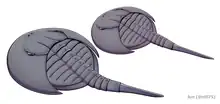| Lunataspis Temporal range:
Earliest Hirnantian | |
|---|---|
 | |
| Reconstruction of Lunataspis aurora (bottom left) and Lunataspis borealis (top right) | |
| Scientific classification | |
| Domain: | Eukaryota |
| Kingdom: | Animalia |
| Phylum: | Arthropoda |
| Subphylum: | Chelicerata |
| Order: | Xiphosura |
| Suborder: | Xiphosurida |
| Genus: | †Lunataspis Rudkin, Young & Nowlan, 2008 |
| Type species | |
| †Lunataspis aurora Rudkin, Young & Nowlan, 2008 | |
| Species | |
| |
Lunataspis is the oldest known xiphosuran. It was first formally described by David Rudkin, Graham Young and Godfrey Nolan, from fossils found in northern Manitoba, Canada in 2005; the deposit dates from the Late Ordovician, c. 445 million years ago.[1][2][3]
Discovery and species
The type species, L. aurora, was described from remains found in the Konservat-Lagerstätten deposits of the Stony Mountain Formation, central Manitoba. The specific name aurora is Latin for 'dawn' and is also eponymous with the mythological Roman goddess.[1]
A second species, L. borealis, was described in 2022 based on three specimens, including an adult (ROM IP 64616) and two juveniles or subadults (ROM IP 64617 and ROM IP 64618). All specimens were found in the upper member of the Gull River Formation in Kingston, Ontario.[4]
See also
References
- 1 2 David M. Rudkin, Graham A. Young & Godfrey S. Nowlan (2008). "The oldest horseshoe crab: a new xiphosurid from Late Ordovician Konservat-Lagerstätten deposits, Manitoba, Canada". Palaeontology. 51 (1): 1–9. doi:10.1111/j.1475-4983.2007.00746.x.
- ↑ Chliboyko, J. Crabby Ancestors, Canadian Geographic Magazine, April 2008, p. 25
- ↑ Dunlop, J. A., Penney, D. & Jekel, D. 2015. A summary list of fossil spiders and their relatives. In World Spider Catalog. Natural History Museum Bern, online at https://wsc.nmbe.ch , version 18.5 https://www.wsc.nmbe.ch/resources/fossils/Fossils18.5.pdf (PDF).
- ↑ Lamsdell, James C.; Isotalo, Phillip A.; Rudkin, David M.; Martin, Markus J. (October 2022). "A new species of the Ordovician horseshoe crab Lunataspis". Geological Magazine: 1–5. doi:10.1017/S0016756822000875. ISSN 0016-7568.